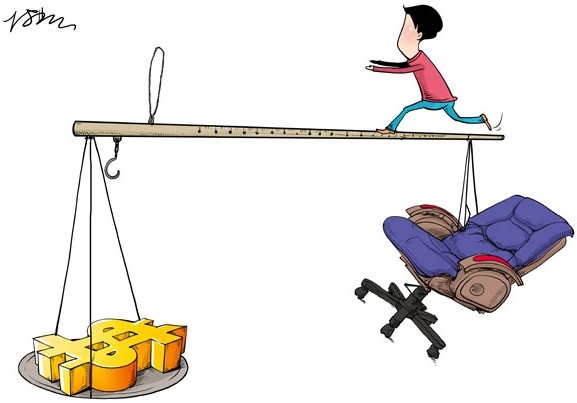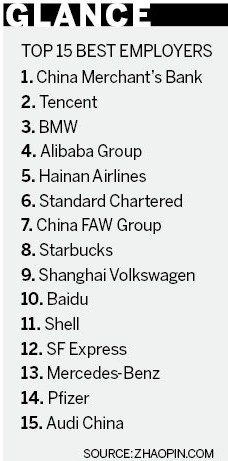


What makes an ideal employer for white-collar employees has changed over the years, a report found.
The factors in this changing perception are not all strictly work-related as inflation, general welfare and high property prices also play a role, the report jointly released by Zhaopin.com and Beijing University's Institute of Social Science Survey showed.
The annual report was published on Dec 13, together with a list of what are considered to be the top 30 best employers in China.
The survey conducted interviews in 2,132 companies in 17 industries, mostly in first- and second-tier cities.
"Compared with two years ago, white-collar workers are not just focused on high salaries but want more of a welfare package," said Zhu Hongyan, a senior career consultant at Zhaopin.com, one of the country's biggest job-hunting websites.
"They also care more about whether they can get respect, and enjoy good working relationships in the office, rather than simply promotion opportunities, as in the past," she added.
Xu Jianhong, 25, graduated from a top university in Nanjing in 2011 and began work at a leading consulting firm in Shanghai.
"My salary is considered high compared to my classmates, and that's the main reason I chose the job," he said. "But now I find it not worthwhile as the working hours are too long, and there is no work-life balance. I don't have a hukou (household registration) so I cannot enjoy the benefits that come with it."
Xu said that in a year or two, he will consider changing jobs to a more stable company, preferably a State-owned company (SOE) as they have better welfare packages.
"I don't regret the choice I made as I acquired a great many job skills and the relationships within the company are good, with no hierarchy, no bureaucracy. We can discuss issues with the big boss anytime," he said, wondering whether any new job would offer such a pleasant environment.
"If I change and work in an SOE, I worry that the environment within the company will be different and I will have a hard time getting used to the hidden rules."
Xu's opinion was echoed by many of his peers.
Liang Lin, 29, graduated with a master's degree in business from a top university. She has changed jobs three times over the past five years, and said her preference has changed as well.
"The first job I had was with a US insurance company," she said. "It was good pay but long hours."
She wanted a better work-life balance, where she has time to do the things she wants to do.
Now she is representing her company, which is an SOE, as it opens a joint venture with a local company in Shanghai.
"I have more free time, and I get a good social welfare package," she said. "I can do things I enjoy."
Zhu, the career consultant, explained that this change is in line with the theory of Maslow's Hierarchy of Needs. Maslow was a US psychologist who published a well-known paper in 1943 that prioritized human needs.
"This shows that an employee needs develop from basic physiological to higher psychological needs, as the theory explained," she said. "Maslow describes this level as the desire to accomplish everything that one can, to become the most that one can be."
Zhu also explained that SOEs, as they have a market monopoly in certain industries, can provide employees with better welfare packages, including hukou, medical care, children's education and perhaps housing. That complete package, which is hard to get even if a worker has a high salary, is more attractive nowadays.
"As a fresh graduate, I believed that money talked, but now I realize the importance of work-life balance, and the process of self-actualization. To do what you want to do and be allowed to do so is truly a blessing," said Li Xinyuan, who has worked with a US law firm since 2010 after graduating with a law degree from an Ivy-league university in the US.
Her monthly income is double that of her peers who work in SOEs but she said she feels that the money alone is not reward enough.
Li is thinking of getting a PhD degree and then teaching.
"That is more meaningful to me," she said.
Gen Y‘s motto: show me the money
2014-01-017.27 mln grads expected in 2014
2013-12-17Employment rate of college grads questioned
2013-10-113 in 4 expect to change jobs in 2014
2014-01-08Copyright ©1999-2018
Chinanews.com. All rights reserved.
Reproduction in whole or in part without permission is prohibited.